- Home
- Parris Afton Bonds
Indian Affairs (historical romance)
Indian Affairs (historical romance) Read online
P A R R I S
A F T O N
B O N D S
I N D I A N A F F A I R S
Turning conventional wisdom on its head, Washington socialite Alessandra O'Quinn and her lover, Indian shaman Manuel Mondragon, defy time and space and politics and families to come together in the sweeping canvas of the 1920's New Mexico outpost of Taos. Can they defy Destiny to stay together?
Published by Paradise Publishing
Copyright 2012 by Parris Afton, Inc.
All Rights Reserved
Cover artwork by Erin Dameron Hill
Kindle Edition, License Notes
This is a work of fiction and a product of the author’s imagination. No part of this novel may be used or reproduced in any manner whatsoever without written permission except in the case of brief quotations embodied in critical articles and reviews. This ebook may not be re-sold or given away.
BONUS
First chapter of my novel THE MAIDENHEAD is at the end of INDIAN AFFAIRS
For Dave, Connie, and Cynthia Stump, my chocolatiers
And
Hana Norton, whose beautiful spirit led the way to this story.
AUTHOR’S NOTE
Indian Affairs grew out of my abiding interest in magical, mystical Taos, hidden among the mountains of northern New Mexico. My heroine Alessandra O’Quinn is a composite of three women I encountered while researching the 1920’s Taos: the avant-garde philanthropist Mabel Dodge Luhan, who found her soul mate, the Taos Pueblo Indian Tony Luhan, “in the eleventh hour of my life”; Stella Atwood, who raised money, hired lawyers, and lobbied to elevate the Pueblos’ mistreatment to the level of a national issue; and a remarkable spinster, Edith Warner, treasured by all who knew her – from her Indian love Tilano to years later Niels Bohr, Robert Oppenheimer, and other atomic scientists at Los Alamos who often visited Edith’s house at Otowi Bridge. Lastly, the novel Ramona first stirred my youth’s interest in its romantic tale of the Indian plight and has brought me full circle to Indian Affairs.
Parris Bonds
Rio Rancho, New Mexico
Chapter One
“You asked for the truth, Mrs. O’Quinn. You’re dying.”
“Aren’t we all, Doc?”
“Don’t be flippant, Alessandra,” her father said.
She ceased her pacing before the library’s terrace doors and crossed quickly to the sideboard. She wouldn’t let the men see her cry. Ever. Selecting a crystal decanter, she poured a glass of gin, highly illegal to possess since the Great World War and highly fortifying at that moment.
Her father frowned. His lantern jaw clenched. She knew he was damming his throat’s lethal words till later. One of his cardinal rules: fight one battle at a time.
After a sustaining gulp, Alessandra faced the four men in the library. “I believe my question, Dr. Silverman, was how long do I have?”
A retired army doctor, Burt Silverman still deferred to higher authority. Always. His gaze slid from the library’s French doors, frosted by a November genie, to peer through the shield of his thick spectacles at her father, enthroned on his wheelchair.
“Bully! The truth, Burt.” The General’s steel-gray eyes glared, and his walrus mustache drooped even further over the slope of invisible lips. His back was stiff as the cavalry saber he had carried at his side into the Spanish-American War of 1898 under Colonel Leonard Wood and his Rough Riders.
Alessandra’s husband tossed his big-barreled Waterman fountain pen onto a desk littered with shiny implements: a magnifying glass, a bronze ink well, and pen-holders. She knew that desk well. She had written most of Brendon’s and the General’s political missives from it. “Look here, General,” Brendon pressed, “what we need is more information.”
“What we need,” her brother Paul said, “is a little less tension.” Paul cranked up the Victrola. Delores Del Rio’s scratchy “Ramona” stirred the room’s stagnant air.
Over the rim of her glass, Alessandra flicked Paul an impatient glance. Four years her junior, he was a graduate of Yale with an engineering degree. At thirty-five, her brother’s major accomplishment was playing for the U. S. team that won the 1913 Davis Cup. He shrugged and grinned.
She turned back to the other three men. “Well, Dr. Silverman?” she prompted.
The old gent’s lips twitched. “With your lungs weakened by . . . .” He shrugged. “Well, who can say, really?”
Brendon shoved his ponderous Turkish chair away from the desk, almost upsetting the majolica cuspidor. He grabbed her half-empty glass, thumped it on the sideboard, and wrapped his arm around her waist. A superb golfer, boxer, and hunter, her suavely handsome husband had elicited her father’s admiration as had none of her other suitors. “Alessandra and I can lick this — this problem. Just tell us what we need to do.”
A little of the tension seeped from her. Brendon had always been her lightning rod. And where her father was brusque and her brother detached, Brendon exuded joie de vivre.
Thumbs tucked behind his suspenders, Dr. Silverman’s gaze lingered sightlessly for a long moment on the knotted pile carpet’s fuchsia flowers. At last, he raised world-weary eyes shadowed with compassion. “There are sanitariums in the Southwest, Alessandra. Occasionally, we see evidence that a person’s lungs dry out in that climate.”
“Occasionally?” Brendon’s handsome brow furrowed. “That’s the best medicine can hope for in 1922?”
“For how long?” she asked, trying not to let lassitude creep into her voice. Fatigue, malaise, intense stabbing pain, night sweats . . . all had made themselves at home in her thirty-nine-year-old body for several years now.
“How long would we need to stay out there?” Brendon supplemented her question with a strong authority.
The doctor, who had delivered her and buried her mother, lifted sagging shoulders. “A year. Maybe longer.”
“Brendon,” her father said, “don’t even think about taking off from legislature. A year away from Washington would kill your career.”
In the maw of silence, Brendon said, “Well, if worse came to worst, Jeremy and I could make several trips out West. Visit off and on.”
“I can’t be away from Jeremy that long!”
“Paul, turn off that infernal machine,” her father ordered.
Paul rolled his eyes, but he halted the tinny, romantic music. “You summoned me to the family pow-wow, so here’s my contribution. We sell this damned mausoleum, move out to Los Angeles and go into the movie business. Alessandra dries out, I marry Gloria Swanson, Brendon becomes a movie star, and you, General, do what you do best . . . direct.”
Her father ignored Paul’s sarcasm and aimed the full force of his military bearing at her. “Get yourself together, Alessandra. Without your mother to raise you, I’ve let you have your way too often. You’ve always done your own thing. Well, selfishness be damned. Not this time. It’s either a year away from your family or . . . forever. That’s not such a difficult decision, is it?”
From their posts on the dark-paneled walls, Brendon’s trophies of elk, sheep, lion, and antelope stared at her with eternally alarm-widened eyes. The room was full of things that had died.
Her mother dead, her mother-in-law committed to a sanitarium, she felt alone against these male adversaries. By God, she would not be taken down so easily. She stepped outside Brendon’s protective arm. “I want Jeremy with me.”
“Ali, you know he can’t miss school. The Citadel has already accepted him for — ”
She whirled on Brendon. “Jeremy’s not even eleven.” Her gaze flicked from one male to the next. “Stop trying to make Jeremy into a man. He’s still a boy.” She felt outnumbered and helpless.
She held her ground anyway. “Besides, there are schools in the West.”
Brendon drew a deep, frustrated breath. “Damn’t, Ali, I’m just trying to find a way to make this work. Jamming his hands in his trousers, he looked to her father. “General?”
“No schools out west are as good as Foxhurst Prep,” her father’s voice resonated, like Moses delivering the Ten Commandments.
Arms crossed, Paul braced one shoulder against the bookcase. “Didn’t you always say it was good for a man to learn to rough it — sir?”
Her brother would have made a great understudy for King Arthur’s nephew. Or was Sir Modred his son? Or both? She could never remember.
“And weren’t you posted in the New Mexico Territory as a young man?” Paul prodded even more. “Fort Stanton, wasn’t it, sir?”
The General ignored Paul. Their father never liked being reminded he was getting old . . . or that he was disabled. “We lost your mother, Alessandra. We don’t want to lose you and Jeremy both.”
“It will be a wonderful adventure for Jeremy,” she declared.
Her husband kissed her temple gently. “Jeremy and I will come to Taos at summer break, Ali. Meanwhile, it’ll be a wonderful adventure for you. Try to keep that in mind, sweetheart.”
* * * * *
The bathroom was state of the art with a recessed gas heater, hexagonal white tile floor, a polychromed basin sunk in a marbled slab, an indoor water closet and a bidet. Brendon had a conjugal right to Alessandra in their bedroom, but that the bathroom was her private sanctuary was a tacit understanding between them.
The imposing Rock Creek mansion was Brendon’s legacy from his grandfather, a former United States vice president who had made a fortune during the Civil War buying cotton from Mexico and selling it to English and French textile mills. By Brendon’s good graces, her father and Paul lived there as a happy family unit.
Another legacy left by Brendon’s grandfather and father was the vital importance of always being number one. Of always striving. Always achieving. Sometimes her heart went out to the child Brendon must have been, the child who was never enough just as he was.
Saturday morning. She and Brendon had just made love, as they did every Saturday morning before his cricket game. And as usual, he would afterwards motor away to a triumph on that other field of endeavor. Feeling like a whore, she’d lie in bed until after he left.
This morning after he had left, salty tears she had been unable to check had slipped down her cheeks. The first time since Dr. Silverman had delivered his blow. But she would cry no more. Crying had changed nothing. The big, bad boogeyman was still there.
Besides, her thin, narrow-shouldered body had no moisture left. Except in its lungs. How damnably paradoxical. Her lungs were drowning. At the same time she was atrophying: drying up, shriveling. Even her womb had shriveled, never to bear babies again.
Brendon and the General were fine with just one child rambling about in the mansion. Most likely, she thought bitterly – and she knew she was being unfair – because they had Jeremy to carry on the political dynasty they were creating.
She supposed she should bestir herself. Review her agenda journal. There was the Bryn Mawr Alumnae lunch at the Women’s Club. Willa Cather was guest speaker, but Brendon was contemptuous of the author’s preference for her own gender.
The Republican Party annual gala. Alessandra was ticket chairman.
Red Cross Society meeting at 3:00; she had organized a local chapter during the first year of America’s entry in the Great World War.
A reception at the DuPont’s at 6:00.
Then dinner with the old goat that President Harding had just appointed secretary of the Interior . . . dammit, what was the man’s name? . . . and his wife. A fat beetle who tottered around in high-button shoes with her flesh puffing around their tops.
Albert Fall, that was his name. Former senator from New Mexico.
She relaxed a little more. One less detail to keep in mind. So many things to accomplish, so much to remember, and all the while her time was shrinking. Her marriage was a microcosm of her life, a photograph of practicality and speed.
She and Brendon made obligatory love hastily and telephoned and talked to each other at a furious rate. She heard his footsteps on the stairs, his long sportsman’s legs taking two steps at a time. He called her name. What’s he forgotten?
Her lethargy shrank from that boisterous male exuberance that had once so captivated her . . . and often still did. She sank lower in the claw-foot bathtub. The lilac scented water lapped unseen lacerations. When the door was flung wide, her hands splashed protectively across the small, hard knots of her breasts.
“Ali! Guess what!”
She sighed and said, “You’ve been nominated for President.” Brendon’s own sights were set even higher than his grandfather’s. She couldn’t look him in the eye, couldn’t tell him what she was really feeling . . . the aggravation, the annoyance, and yes, even occasional anger . . . wondering if she really still loved him after all the years. Or if he still loved her.
“I’m serious. Ali, listen. I’ve just run into Holm Bursum . . . you know, the one elected to take Albert Fall’s vacated senate seat in New Mexico. Well, Bursum may be Fall’s ‘yes’ man, but he has some contacts in — ”
“Brendon, can this wait until later?”
He leaned over and grabbed her palms. His wavy brown hair, neatly parted on the left fell forward. “You’re not listening, Ali. As usual.”
“Please, do you mind?” She pried her hands loose. “Let me finish my bath. You know this is the only — ”
“All right, all right. But stop being so petulant I only wanted to tell you that Bursum can – “
“Petulant?!”
“Ali, is it always about you? Damn’t I know you’re seriously ill, but I’m trying my best!”
“Well, what if your best isn’t enough? I don’t want to be shipped off to some outpost like a machinery part or – ”
He stopped her, holding up his palms. “I’m sorry, all right?” He flashed her that ingenuous grin she, and anyone else in his presence for thirty seconds, found so charming. “I’ll meet you in the solar room in fifteen minutes.”
“You’ve already breakfasted,” she said suspiciously. “And what about your cricket match?”
“The boys won’t begin without me.” He flicked water on her exposed breasts. “Now hurry.” With a wink of farewell, he closed the bathroom door.
No! Her fist sloshed a geyser of bathwater. Not this time!
This time she would not be put off with Brendon’s charm. Nor with the General’s intimidation. Nor with Paul’s manipulation. Her spirit was worn thin by all its futile little defiances that ended in soul-snatching surrenderings. There had to be more to life than mere existence. From this moment, she would craft her life, even to its end. No more surrendering. Go out with a blaze, damn’t. Both guns firing.
* * * * *
The latest cook, supplied by a French employment bureau, had prepared poached eggs, toasted croissants, and halved grapefruit, all served on blue and white Sevres. Brendon, whom Alessandra had met in Paris, was a dedicated Francophile.
At the sight of her, Brendon gulped the last of his orange juice, caught her hand and tugged her toward the wrought-iron chair opposite him. He wore white flannel trousers, white canvas shoes, and a white sweater with his cricket club colors at neck and waist.
She nodded at the frosty windows. “Looks too cold for cricket.”
“It’s never too cold for cricket,” he said, grinning. “Ali, Bursum told me there’s some sort of quaint artist colony up in the mountains of — ”
Her hand’s dismissive gesture curbed his rambling. “Brendon, I gave up painting years ago.” She reached for her glass of orange juice, as chilly as the mid-morning.
“For God’s sake, Ali, hear me out. Taos is said to be a civilized community in New Mexico’s high desert. The perfect spot for recuperation.”
“Ne
w Mexico is in the middle of nowhere. A nowhere two-thousand miles too far.” She noticed her foot kicking and quickly stilled the nervous habit. “Do you have a cigarette?’
“The isolation would be perfect for your . . . tightly wound constitution.”
“Like your mother’s?” Uneasiness mitigated whatever challenge her breathless question posed.
He fished an engraved case from his trouser pocket and offered her a cigarette. “Bursum knows a Canadian poet there, Henri Genêt. He can speak French, so he can’t be all that bad.”
When she didn’t smile, he went on. “Anyway, Bursum says that Genêt is a guest of that New York bohemian person, Mabel Whatever-Her-Name-Is, and that Henri can help you settle into life at Taos.”
“Mabel Ganson Evans Dodge Stern Luhan.” The woman, a fabulously wealthy offspring of a banking and cereal family, had left her latest husband to take up residence in Taos with a blanket Indian, or so rumor had it.
“Well, the woman is famous for her hospitality both in Florence, Italy and in Taos, New Mexico. There’s even a doctor there, Ali. Bursum says Doc Martin is a crusty old hooch hound but he worked tirelessly to save the Taoseños during the influenza epidemic.”
After he lit the cigarette for her, she exhaled. “These coffin nails ought to dry out my lungs.”
With a grimace, he pocketed the gold case. “If your drinking doesn’t kill you first.”
She glanced beyond the flagstone terrace’s symmetrical silver poplars and the manicured lawn sloping toward the maple-shaded Rock Creek. Autumn’s frigid nights had already killed the leaves. Her gaze fixed on Brendon. “If I agree to resign myself to that God-forsaken outpost, I want Jeremy to go with me.”
Brendon sighed then squeezed her wrist. “Ali, I’m sorry you’re going through all of this. Really. Look, I’ve got to go. Love you.” He leaned over and kissed her. On the cheek. As if her lips might pass on to him the illness in her lungs. But invading her body with his penis was apparently not a hazard to his well-being.

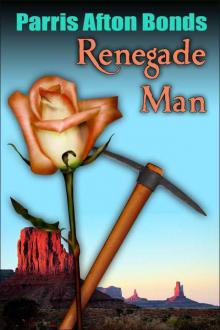 Renegade Man
Renegade Man Sweet Enchantress
Sweet Enchantress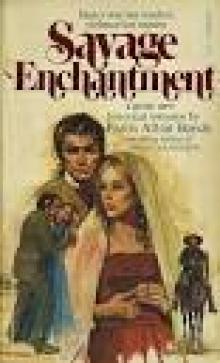 Savage Enchantment
Savage Enchantment Mood Indigo
Mood Indigo Indian Affairs (historical romance)
Indian Affairs (historical romance)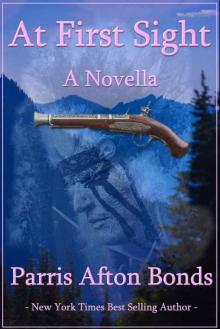 AT FIRST SIGHT: A Novella
AT FIRST SIGHT: A Novella The Maidenhead
The Maidenhead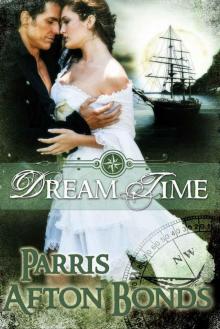 Dream Time (historical): Book I
Dream Time (historical): Book I Made For Each Other
Made For Each Other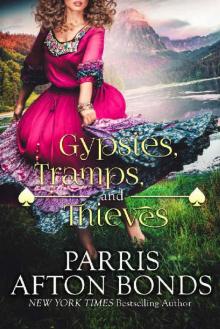 GYPSIES, TRAMPS, AND THIEVES
GYPSIES, TRAMPS, AND THIEVES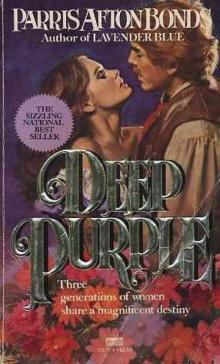 Deep Purple
Deep Purple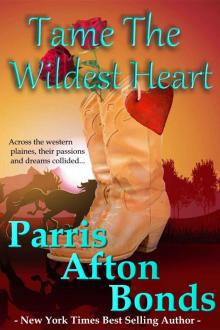 Tame the Wildest Heart
Tame the Wildest Heart LAVENDER BLUE (historical romance)
LAVENDER BLUE (historical romance)